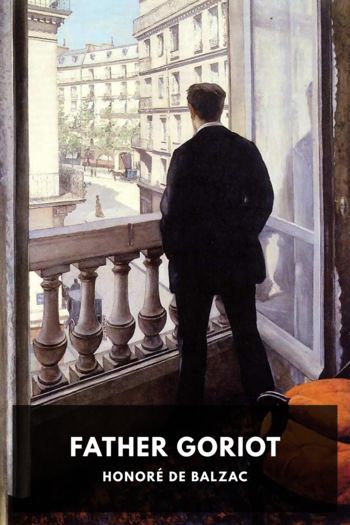Father Goriot, Honoré de Balzac [different e readers .txt] 📗

- Author: Honoré de Balzac
Book online «Father Goriot, Honoré de Balzac [different e readers .txt] 📗». Author Honoré de Balzac
“If Mme. de Nucingen takes an interest in me, I will teach her how to manage her husband. That husband of hers is a great speculator; he might put me in the way of making a fortune by a single stroke.”
He did not say this bluntly in so many words; as yet, indeed, he was not sufficient of a diplomatist to sum up a situation, to see its possibilities at a glance, and calculate the chances in his favor. These were nothing but hazy ideas that floated over his mental horizon; they were less cynical than Vautrin’s notions; but if they had been tried in the crucible of conscience, no very pure result would have issued from the test. It is by a succession of suchlike transactions that men sink at last to the level of the relaxed morality of this epoch, when there have never been so few of those who square their courses with their theories, so few of those noble characters who do not yield to temptation, for whom the slightest deviation from the line of rectitude is a crime. To these magnificent types of uncompromising Right we owe two masterpieces—the Alceste of Molière, and, in our own day, the characters of Jeanie Deans and her father in Sir Walter Scott’s novel. Perhaps a work which should chronicle the opposite course, which should trace out all the devious courses through which a man of the world, a man of ambitions, drags his conscience, just steering clear of crime that he may gain his end and yet save appearances, such a chronicle would be no less edifying and no less dramatic.
Rastignac went home. He was fascinated by Mme. de Nucingen; he seemed to see her before him, slender and graceful as a swallow. He recalled the intoxicating sweetness of her eyes, her fair hair, the delicate silken tissue of the skin, beneath which it almost seemed to him that he could see the blood coursing; the tones of her voice still exerted a spell over him; he had forgotten nothing; his walk perhaps heated his imagination by sending a glow of warmth through his veins. He knocked unceremoniously at Goriot’s door.
“I have seen Mme. Delphine, neighbor,” said he.
“Where?”
“At the Italiens.”
“Did she enjoy it? … Just come inside,” and the old man left his bed, unlocked the door, and promptly returned again.
It was the first time that Eugène had been in Father Goriot’s room, and he could not control his feeling of amazement at the contrast between the den in which the father lived and the costume of the daughter whom he had just beheld. The window was curtainless, the walls were damp, in places the varnished wallpaper had come away and gave glimpses of the grimy yellow plaster beneath. The wretched bed on which the old man lay boasted but one thin blanket, and a wadded quilt made out of large pieces of Mme. Vauquer’s old dresses. The floor was damp and gritty. Opposite the window stood a chest of drawers made of rosewood, one of the old-fashioned kind with a curving front and brass handles, shaped like rings of twisted vine stems covered with flowers and leaves. On a venerable piece of furniture with a wooden shelf stood a ewer and basin and shaving apparatus. A pair of shoes stood in one corner; a night-table by the bed had neither a door nor marble slab. There was not a trace of a fire in the empty grate; the square walnut table with the crossbar against which Father Goriot had crushed and twisted his posset-dish stood near the hearth. The old man’s hat was lying on a broken-down bureau. An armchair stuffed with straw and a couple of chairs completed the list of ramshackle furniture. From the tester of the bed, tied to the ceiling by a piece of rag, hung a strip of some cheap material in large red and black checks. No poor drudge in a garret could be worse lodged than Father Goriot in Mme. Vauquer’s lodging-house. The mere sight of the room sent a chill through you and a sense of oppression; it was like the worst cell in a prison. Luckily, Goriot could not see the effect that his surroundings produced on Eugène as the latter deposited his candle on the night-table. The old man turned round, keeping the bedclothes huddled up to his chin.
“Well,” he said, “and which do you like the best, Mme. de Restaud or Mme. de Nucingen?”
“I like Mme. Delphine the best,” said the law student, “because she loves you the best.”
At the words so heartily spoken the old man’s hand slipped out from under the bedclothes and grasped Eugène’s.
“Thank you, thank you,” he said, gratefully. “Then what did she say about me?”
The student repeated the Baroness’ remarks with some embellishments of his own, the old man listening the while as though he heard a voice from Heaven.
“Dear child!” he said. “Yes, yes, she is very fond of me. But you must not believe all that she tells you about Anastasie. The two sisters are jealous of each other, you see, another proof of their affection. Mme. de Restaud is very fond of me too. I know she is. A father sees his children as God sees all of us; he looks into the very depths of their hearts; he knows their intentions; and both of them are so loving. Oh! if I only had good sons-in-law, I should be too happy, and I dare say there is no perfect happiness here below. If I might live with them—simply hear





Comments (0)